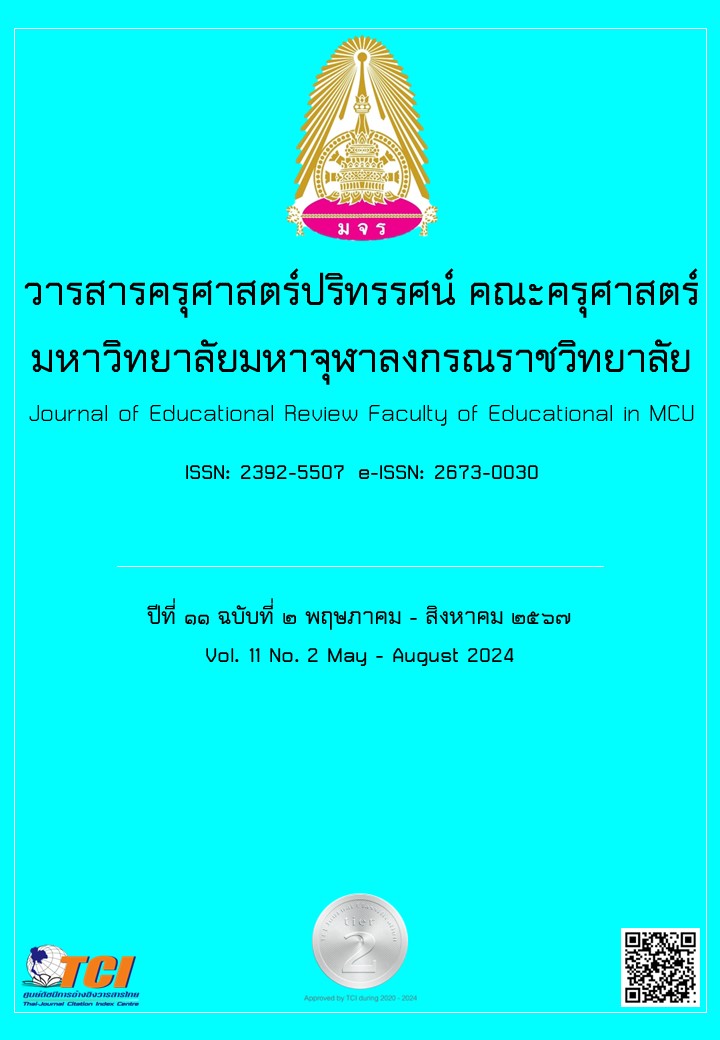THE PACKAGE KNOWLEDGE FOR SELF-DEVELOPMENT BASED ON THE THREEFOLD PRINCIPLES IN THE TIPITAKA
Main Article Content
Abstract
This research article aimed to study 1) the principle of Tri-sikkh as appeared in the Tipitaka, 2) to study self-development according to the principle of Tri-sikkh in the Tipitaka, and 3) to study the creation of a knowledge set for self-development according to the principle of Tri-sikkh in the Tipitaka. This research was conducted by using documentary research methods and in-depth interviews with 15 key informants. The research was conducted by studying documents and collecting data from the interviews. The data were analyzed according to the content. The research results found that 1) the principle of Tri-sikkh as appeared in the Tipitaka by Tri-sikkh was the principle of training the body, speech, mind, and intellect. Sīla is the practice for training the body and speech to be proper, which will affect the development of the mind and intellect in the future. Samdhi is the determination of the mind, the state of the mind having one emotion, steadfast on one emotion, and the state of the mind that is aware of a particular emotion. Paññ is clear knowledge, that is, knowledge by various characteristics that are greater than knowing (Saññ) and clear knowledge (Viññṇa). 2) Developing oneself according to the principle of Tri-sikkh in the Tipitaka, that is, training oneself in terms of precepts, concentration, and wisdom. (1) Sīla is a training in behavior by using discipline as a tool to train good behavior and arranging an environment suitable for development. (2) Samdhi is a training in the mind or at the mental level, that is, developing qualities, virtues, and happiness of the mind by using the practice of Samatha meditation as a tool to train the mind to be calm and stable as concentration. (3) Paññ is a training in knowing the truth by using analysis, pondering, examining, and thinking of various things as tools to train wisdom to be clear and to know and see as it is until reaching freedom. And 3) Creating a set of knowledge for developing oneself according to the principle of Tri-sikkh in the Tipitaka, that is, (1) Creating a set of knowledge for developing oneself according to the principle of Sīla in the Tipitaka as the principle of behavior to have good behavior in body, speech, and mind, consisting of self-discipline, being able to conduct oneself, maintain discipline, live together in a good society, have relationships with society, perform duties and be responsible to society and contributes to the benefits. (2) Creating a set of knowledge to develop oneself according to the principles of Samdhi in the Tripitaka. The principles of training the mind to have concentration include sitting meditation, training the mind to be naturally calm, maintaining discipline, Sammvyma (Right effort), Sammsati (Right mindfulness), and Sammsamdhi (Right concentration). (3) Creating a set of knowledge to develop oneself according to the principles of Paññ in the Tripitaka. The principles of training the mind to develop wisdom in learning include studying to learn deeply in the desired science, knowing how to listen, thinking and analyzing with reason, being eager to learn, training wisdom to know the truth, Sammdiṭṭhi (Right view), and Sammsaṅkappa (Right thought).
Article Details

This work is licensed under a Creative Commons Attribution-NonCommercial-NoDerivatives 4.0 International License.
ทัศนะและความคิดเห็นที่ปรากฏในบทความในวารสารฉบับนี้ถือเป็นความรับผิดชอบของผู้เขียนบทความนั้นเพียงผู้เดียว และไม่ถือเป็นทัศนะและความรับผิดชอบของกองบรรณาธิการ
กองบรรณาธิการขอสงวนสิทธิ์ในการคัดเลือกบทความลงตีพิมพ์และจะแจ้งให้เจ้าของบทความทราบหลังจากผู้ประเมินบทความตรวจอ่านบทความแล้ว
ต้นฉบับที่ได้รับการตีพิมพ์ในวารสารครุศาสตร์ปริทรรศน์ คณะครุศาสตร์ มหาวิทยาลัยมหาจุฬาลงกรณราชวิทยาลัย ถือเป็นกรรมสิทธิ์ของคณะครุศาสตร์ มหาวิทยาลัยมหาจุฬาลงกรณราชวิทยาลัย ห้ามนำข้อความทั้งหมดหรือบางส่วนไปพิมพ์ซ้ำ เว้นเสียแต่ว่าจะได้รับอนุญาตจากมหาวิทยาลัยฯ เป็นลายลักษณ์อักษร
References
ทวีศักดิ์ ทองทิพย์. (2555). การวิเคราะห์การศึกษาตามหลักไตรสิกขา. สารนิพนธ์สาขาวิชา พระพุทธศาสนา. มหาวิทยาลัยมหาจุฬาลงกรณราชวิทยาลัย.
บุญมี แท่นแก้ว. (2545). พุทธปรัชญาเถรวาท. กรุงเทพมหานคร: โอเดียนสโตร์.
พระธรรมปิฎก (ประยุทธ์ ปยุตฺโต). (2539). การศึกษากับการพัฒนาทรัพยากรมนุษย์. กรุงเทพมหานคร: โรงพิมพ์การศาสนา.
พระมหาสมชาย สุรโตโช (สิงหา). (2556). ศึกษาการบรรลุธรรมของพระจูฬปันถกเถระ. วิทยานิพนธ์พุทธศาสตรมหาบัณฑิต. มหาวิทยาลัยมหาจุฬาลงกรณราชวิทยาลัย.
พระมหาสุธน ยสสีโล (ผลชอบ). (2541). การศึกษาเชิงวิเคราะห์วิปัสสนากัมมัฏฐานในพระพุทธศาสนา. วิทยานิพนธ์พุทธศาสตรมหาบัณฑิต. มหาวิทยาลัยมหามกุฎราชวิทยาลัย.
มหาจุฬาลงกรณราชวิทยาลัย. (2539). พระไตรปิฎกภาษาไทย ฉบับมหาจุฬาลงกรณราชวิทยาลัย, กรุงเทพมหานคร: โรงพิมพ์มหาจุฬาลงกรณราชวิทยาลัย.
แม่ชีศุกร์ภาวดี ณ พัทลุง. (2556). การเรียนรู้เพื่อพัฒนาตนตามหลักไตรสิกขากรณีศึกษาพุทธทาสภิกขุ. วิทยานิพนธ์พุทธศาสตรมหาบัณฑิต. มหาวิทยาลัยมหาจุฬาลงกรณราชวิทยาลัย.
วิทยา ประวะโข. (2561). การสร้างกระบวนการเรียนรู้ตามหลักไตรสิกขาเพื่อพัฒนานักเรียน ในโรงเรียนวิถีพุทธ สังกัดสนักงานเขตพื้นที่การศึกษาประถมศึกษา อุดรธานี เขต 1. ดุษฎีนิพนธ์พุทธศาสตรดุษฎีบัณฑิต. มหาวิทยาลัยมหาจุฬาลงกรณราชวิทยาลัย.


